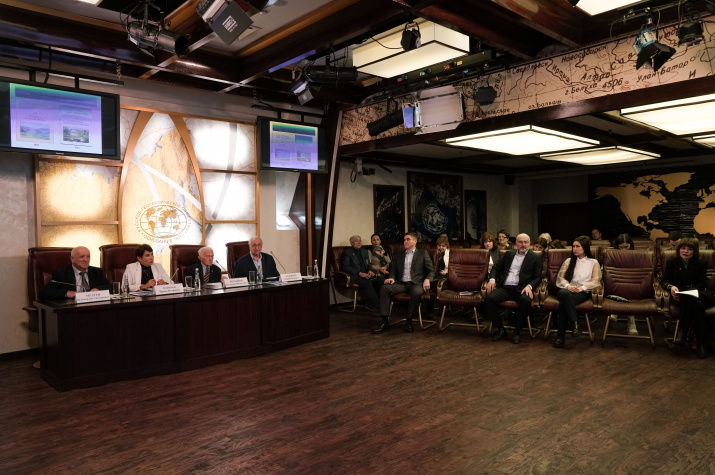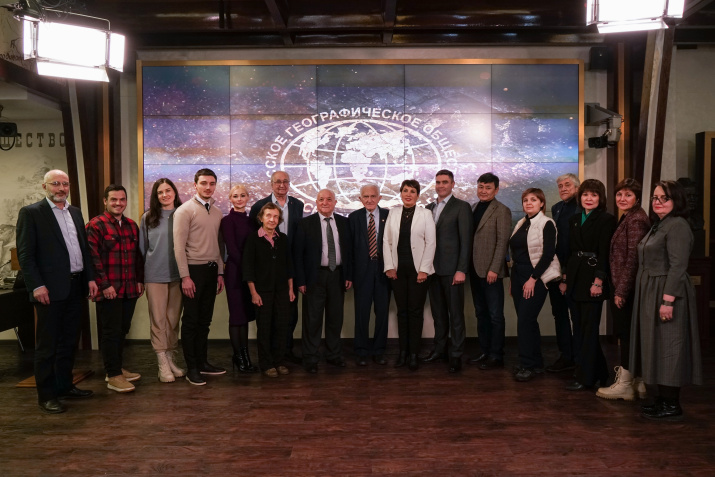The issues of creating and transforming cultural mountain landscapes, preserving the biodiversity of mountain ecosystems, as well as supporting the inhabitants of these territories were discussed at an event dedicated to the celebration of International Mountain Day. The presentations were made by Irina Lozovaya, Deputy Prime Minister of the Republic of Altai, and Shakhmardan Muduev, professor at the Dagestan University of National Economy.
Vladimir Kotlyakov, Chairman of the Tourism Development Commission of the RGS, Honorary President of the Russian Geographical Society, and Academician of the Russian Academy of Sciences, delivered a welcoming speech. He emphasized the special importance of the event in supporting the mountainous regions of Russia.
2022 has been declared by the United Nations as the Year of Sustainable Mountain Development under the succinct slogan “Mountains Matter: For People and the Planet”. The contribution of the Russian Geographical Society to the information agenda of the International Year of Mountains was outlined by Yuri Badenkov, a leading researcher at the Institute of Geography of the Russian Academy of Sciences, a member of the Tourism Development Commission and the Council of Elders of the Russian Geographical Society.
The Tourism Commission of the Russian Geographical Society has played a big role in supporting publications on the issues of developing mountain territories. This includes historical series "Geography Questions" about the study of mountains, man, and the biosphere. This also includes the grant publication “Life in the Mountains” by Yuri Badenkov with examples of the development of different mountain regions of our country in various aspects – the issues of environment and culture, scientific approaches, and a comprehensive study of the evolution issues of mountain territories. In addition, a separate exhibition was organized at the V Festival of the Russian Geographical Society dedicated to mountains. On top of that, a round table on the topic of mountain tourism, which got a lot of public attention, was held at the festival.
“Science, as well as numerous public organizations and the state are indebted to the mountains. We pay insufficient attention to the issues of developing mountain territories, and our main task is to correct this omission,” Yuri Badenkov emphasized.
Another significant contribution to the international agenda was the creation of the Mountain Research Center of the Institute of Geography of the Russian Academy of Sciences. Scientific support for the sustainable development of the mountainous territories of Russia, promotion of an effective mountain policy that takes into account local ecological, geographical, and socio-cultural characteristics of mountain regions, coordination of scientific programs and projects, mobilization of the expert community, and transfer of knowledge and experience in the field of sustainable development of mountainous regions of the world are among the main objectives of this project.
The participants discussed the practical implementation of support for mountainous territories using the example of the two most famous mountainous regions of Russia – Altai and the Caucasus. The strategy for the socio-economic development of the Altai Republic, a Russian region located entirely in the mountains, was announced by Deputy Prime Minister of the Altai Republic Irina Lozovaya.
“It is important for us to improve the quality of tourism products and develop the economy, while preserving the unique nature and passing on the rich cultural traditions of our region to future generations. As a support for these ideas, a local brand ‘Mountainous Altai: The Ecocapital of Russia’ was registered in our region. It perfectly emphasizes the development vector of the region’s potential.”
Professor at the Dagestan University of National Economy Shakhmardan Muduev spoke about the issues of development of mountainous territories from the point of view of mountain residents. The current state of mountainous Dagestan, strategy, practice, and prospects for the development of the region are seen as ambiguous. On the one hand, the Caucasus is the birthplace of numerous Russian all-season recreational resorts developing according to the principles of green tourism. On the other hand, the difficulties associated with life in the mountains are getting worse every year despite visible infrastructure improvements.
“While we are looking for and developing strategies for the conservation of territories, life in the mountains may stop. Today, we have about 1,200 high-mountain settlements left, but most of them are emptying every day – people choose to live in the flatter and more technologically developed territories of the region. Therefore, it is important to create conditions, first of all, for the inhabitants of the mountain regions, including within the framework of the development of tourism.”
The large-scale final event dedicated to summing up the results of the International Year of Sustainable Mountain Development, as well as marking new prospects for work, will be the large-scale Mountain Forum, which will be held in November 2023 in St. Petersburg. It will focus on issues of anthropogenic transformation and environmental infrastructure, international experience in solving the problems of sustainable mountain development, the creation and enhancement of the value of cultural mountain landscapes, the features of socio-political processes in mountain areas, as well as the prospects for the development of mountain tourism clusters.


